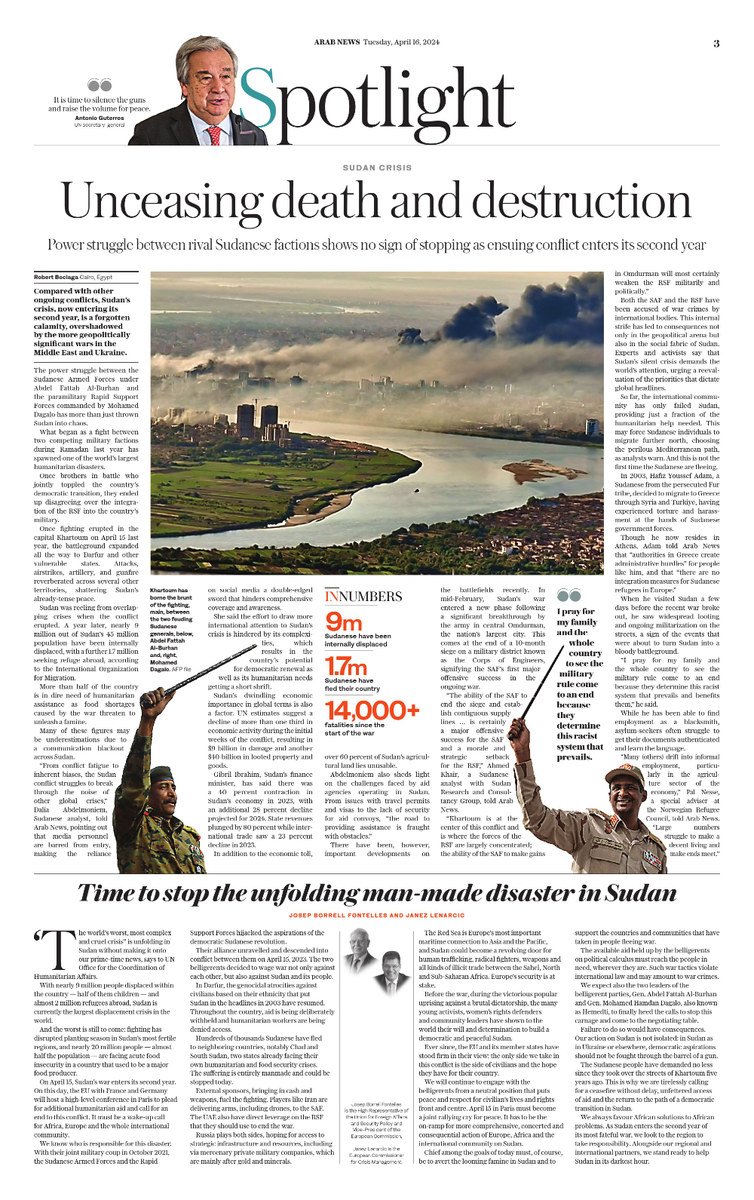CAIRO, Egypt: Compared with other ongoing conflicts, Sudan’s crisis, now entering its second year, is a forgotten calamity, overshadowed by the more geopolitically significant wars in the Middle East and Ukraine.
The power struggle between the Sudanese Armed Forces under Abdel Fattah Al-Burhan and the paramilitary Rapid Support Forces commanded by Mohammed Dagalo has more than just thrown Sudan into chaos.
What began as a fight between two competing military factions during Ramadan last year has spawned one of the world’s largest humanitarian disasters.
Once brothers in battle who jointly toppled the country’s democratic transition, they ended up disagreeing over the integration of the RSF into the country’s military.
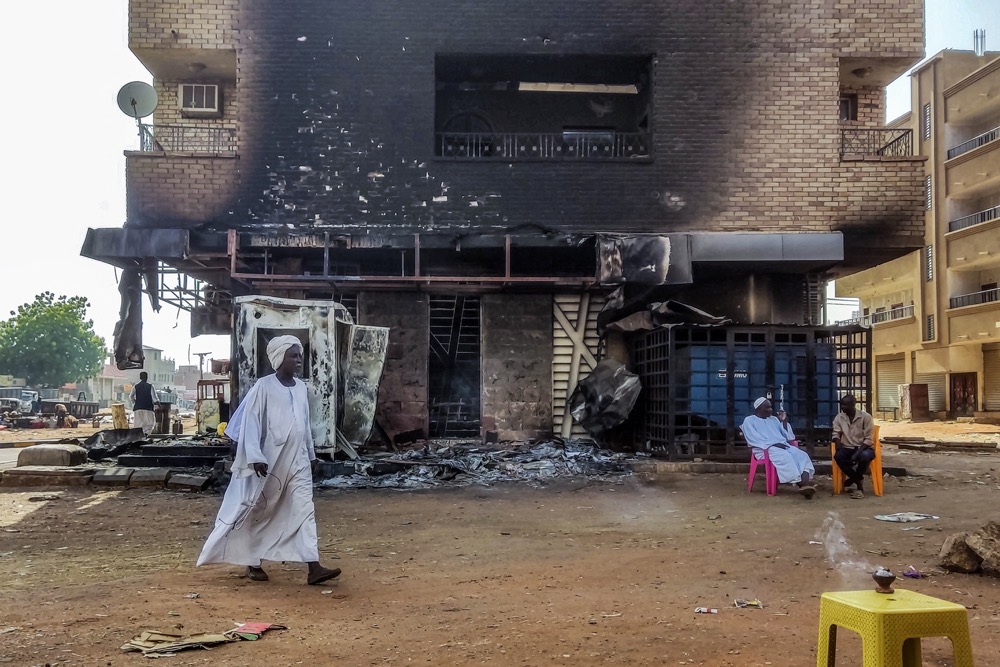
A man walks past a burnt out bank branch in southern Khartoum. (AFP/File)
Once fighting erupted in the capital Khartoum on April 15 last year, the battleground expanded all the way to Darfur and other vulnerable states. Attacks, airstrikes, artillery, and gunfire reverberated across several other territories, shattering Sudan’s already-tense peace.
Sudan was reeling from overlapping crises when the conflict erupted. A year later, nearly 9 million out of Sudan’s 45 million population have been internally displaced, with a further 1.7 million seeking refuge abroad, according to the International Organization for Migration.
More than half of the country is in dire need of humanitarian assistance as food shortages caused by the war threaten to unleash a famine.
Many of these figures may be underestimations due to a communication blackout across Sudan.
“From conflict fatigue to inherent biases, the Sudan conflict struggles to break through the noise of other global crises,” Dalia Abdelmoniem, Sudanese analyst, told Arab News, pointing out that media personnel are barred from entry, making the reliance on social media a double-edged sword that hinders comprehensive coverage and awareness.
She said the effort to draw more international attention to Sudan’s crisis is hindered by its complexities, which results in the country’s potential for democratic renewal as well as its humanitarian needs getting a short shrift.
Sudan’s dwindling economic importance in global terms is also a factor. UN estimates suggest a decline of more than one-third in economic activity during the initial weeks of the conflict, resulting in $9 billion in damage and another $40 billion in looted property and goods.

Sudanese Armed Forces under Abdel Fattah Al-Burhan, left, and the paramilitary Rapid Support Forces commanded by Mohammed Dagalo are engaged in a power struggle. (AFP/File)
Gibril Ibrahim, Sudan’s finance minister, has said there was a 40 percent contraction in Sudan’s economy in 2023, with an additional 28 percent decline projected for 2024. State revenues plunged by 80 percent while international trade saw a 23 percent decline in 2023.
In addition to the economic toll, over 60 percent of Sudan’s agricultural land lies unusable.
Abdelmoniem also sheds light on the challenges faced by aid agencies operating in Sudan. From issues with travel permits and visas to the lack of security for aid convoys, “the road to providing assistance is fraught with obstacles.”
There have been, however, important developments on the battlefields recently. In mid-February, Sudan’s war entered a new phase following a significant breakthrough by the army in central Omdurman, the nation’s largest city. This comes at the end of a 10-month siege on a military district known as the Corps of Engineers, signifying the SAF’s first major offensive success in the ongoing war.
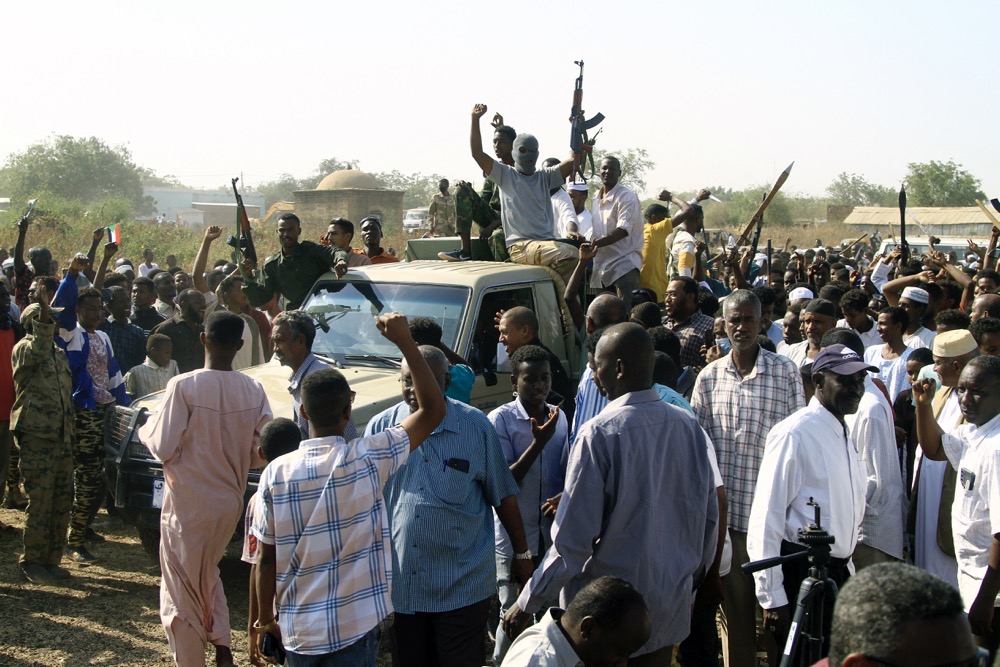
Supporters and members of the Sudanese armed popular resistance in Gedaref, Sudan. (AFP/File)
“The ability of the SAF to end the siege and establish contiguous supply lines … is certainly a major offensive success for the SAF and a morale and strategic setback for the RSF,” Ahmed Khair, a Sudanese analyst with Sudan Research and Consultancy Group, told Arab News.
“Khartoum is at the center of this conflict and is where the forces of the RSF are largely concentrated; the ability of the SAF to make gains in Omdurman will most certainly weaken the RSF militarily and politically.”
Both the SAF and the RSF have been accused of war crimes by international bodies. This internal strife has led to consequences not only in the geopolitical arena but also in the social fabric of Sudan. Experts and activists say that Sudan’s silent crisis demands the world’s attention, urging a reevaluation of the priorities that dictate global headlines.
So far, the international community has only failed Sudan, providing just a fraction of the humanitarian help needed. This may force Sudanese individuals to migrate further north, choosing the perilous Mediterranean path, as analysts warn. And this is not the first time the Sudanese are fleeing.
Opinion
This section contains relevant reference points, placed in (Opinion field)
In 2003, Hafiz Youssef Adam, a Sudanese from the persecuted Fur tribe, decided to migrate to Greece through Syria and Turkiye, having experienced torture and harassment at the hands of Sudanese government forces.
Though he now resides in Athens, Adam told Arab News that “authorities in Greece create administrative hurdles” for people like him, and that “there are no integration measures for Sudanese refugees in Europe.”
When he visited Sudan a few days before the recent war broke out, he saw widespread looting and ongoing militarization on the streets, a sign of the events that were about to turn Sudan into a bloody battleground.
“I pray for my family and the whole country to see the military rule come to an end because they determine this racist system that prevails and benefits them,” he said.
While he has been able to find employment as a blacksmith, asylum-seekers often struggle to get their documents authenticated and learn the language.
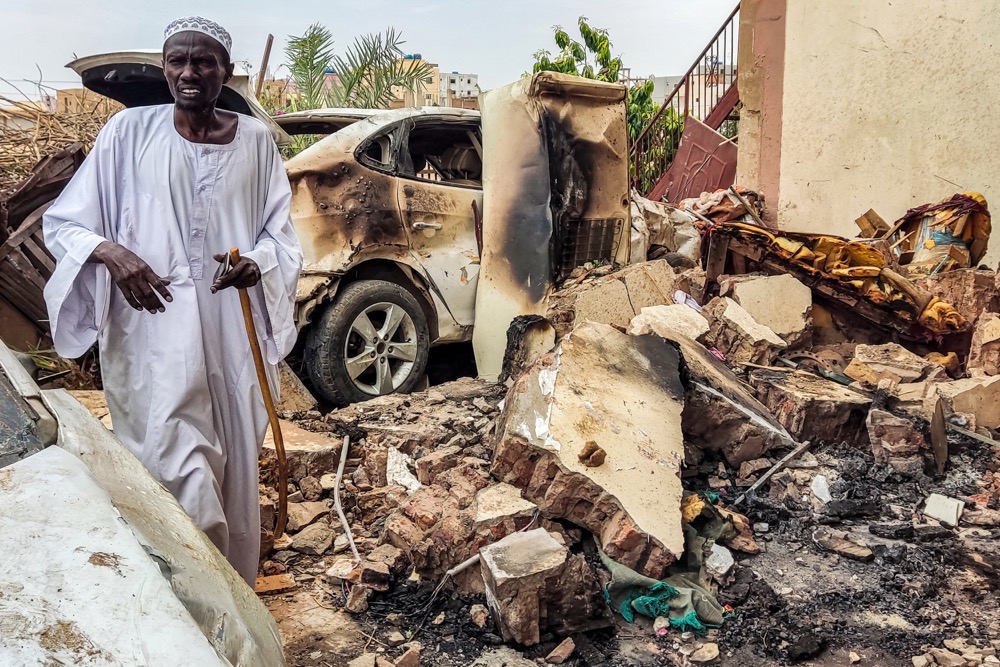
A man inspects damage of an artillery shell in the Azhari district in the south of Khartoum on June 6, 2023. (AFP)
“Many (others) drift into informal employment, particularly in the agriculture sector of the economy,” Pal Nesse, a special adviser at the Norwegian Refugee Council, told Arab News. “Large numbers struggle to make a decent living and make ends meet.”
In contrast, Ukrainian refugees have mostly enjoyed a warmer welcome in European countries, leading to debate about whether or not the EU’s migration policies are tinged by racism.
Other experts claim that Europe’s resources are not strained at all, as reiterated by politicians, and the continent should do more to address migration. “Europe is a wealthy continent,” Jean-Baptiste Metz, head of operations at the Norwegian humanitarian aid organization Drop in the Ocean, told Arab News.
“There is definitely a way to improve the EU state members’ capacities and responsibilities.”
Studies have shown that the integration of refugees could benefit both the host country and refugees themselves. In 2013, Denmark successfully adopted a policy to train and employ refugees in occupations suffering from labor shortages.
In the future, Sudanese refugees could return to their homeland with much-needed new skills and contacts during the difficult reconstruction period.
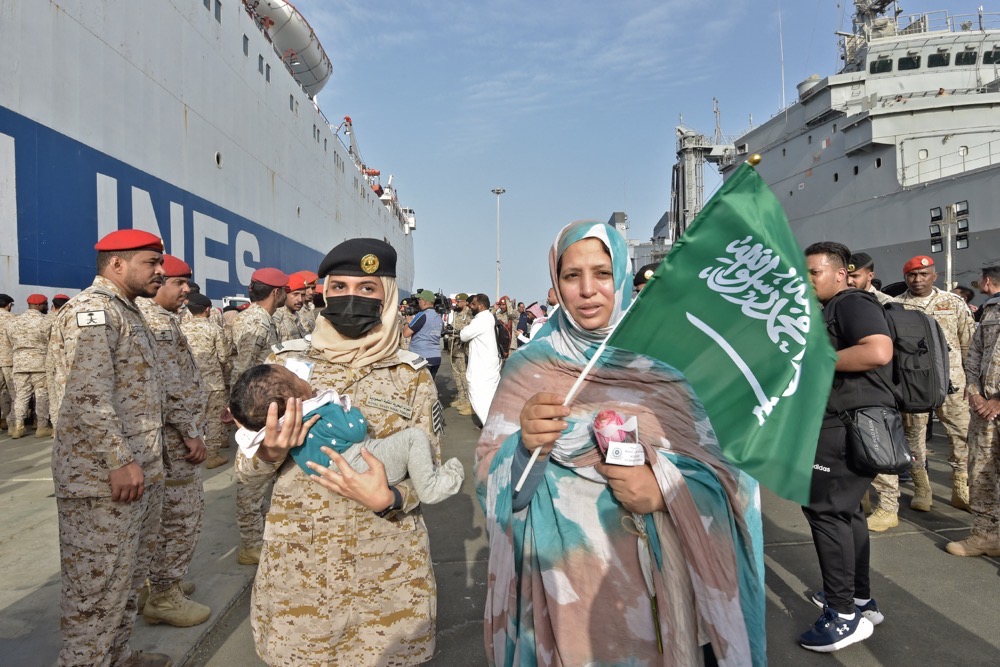
Members of the Saudi Navy Forces assist evacuees arriving at King Faisal navy base in Jeddah on April 26, 2023. (AFP)
Nesse advised that “more alternative legal pathways for refugees and asylum-seekers should be established. There should also be alternative pathways for migrants not necessarily seeking protection but primarily employment.”
However, time has only seen European politics turn against refugees, who are often blamed for various issues from economic crisis to unemployment to crime.
Nesse hopes that the West will address both immediate and long-term needs by supporting Sudan’s ceasefire and peace processes.
“Additionally, there is a crucial requirement for humanitarian assistance, development funding, and favorable trade and tariff regulations.”
